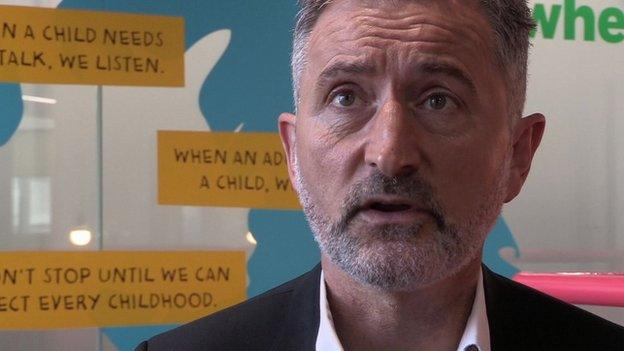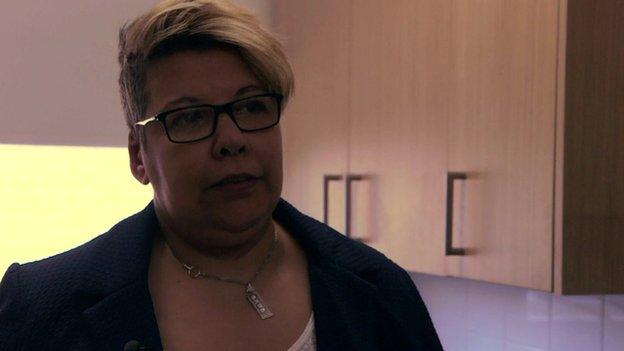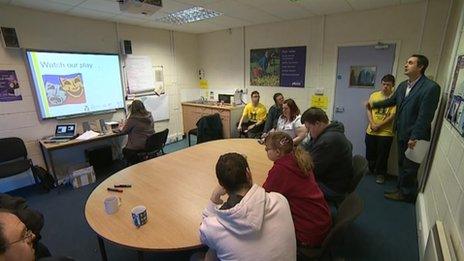Sexual abuse of disabled adults revealed
- Published
'Charlotte', who has Asperger's syndrome, attempted to kill herself after being groomed online
Thousands of disabled adults across England have been sexually abused, figures obtained by the BBC's Victoria Derbyshire programme suggest.
There were 4,748 reports of sexual abuse against adults with disabilities over the past two years, information from 106 councils in England found.
The NSPCC said the cases were "the visible peak" of a much larger problem.
The Local Government Association said councils "work hard to ensure support is available".
The Victoria Derbyshire programme submitted Freedom of Information requests to 152 councils with adult social services responsibilities (CASSRs) in England, asking how many reports of sexual abuse of disabled clients they had recorded over the financial years 2013-14 and 2014-15, up to 16 February 2015.
Data received from 106 of the 152 councils showed that 63% of the 4,748 reported cases were against those with learning disabilities, and 37% against those with physical disabilities.
No comparable figures have previously been collated.
'Horrendous cases'
Jon Brown, head of sexual abuse programmes at the children's charity NSPCC, described the 4,748 cases of reported abuse as "the visible peak" of a much larger problem.
"We know with sexual abuse that many victims find it difficult to speak out," he added, suggesting the real figure may be much greater.

The NSPCC's Jon Brown said many victims find it difficult to report the abuse they suffer
While the Freedom of Information request related just to adult cases, he explained: "We know from research that disabled children and young people are three or four times more likely to be abused and neglected than children and young people who are not disabled.
"Abusers are often very adept at identifying vulnerabilities. And, importantly, we know that it's less likely for children and young people to be believed as well."
Noelle Blackman, chief executive of the charity Respond, said she had seen "some horrendous cases" among the young people who have been referred to it for help. "Certainly from the age of 13," she added, "but sometimes younger".
She continued: "What we're really noticing at the moment is young people being abused by other young people."
"Often the perpetrators don't have a learning disability, and often there will be gangs of boys who don't have a disability who are grooming girls who do, which is a really worrying trend."
Both charities believe more needs to be done to tackle the problem. Respond calls for more resources to be placed into raising awareness of the issue, while the NSPCC believes better training for professionals and parents is required to ensure more young people are willing to report abuse.
The Local Government Association (LGA) said "keeping people safe, including people with learning disabilities, is one of the most important things councils do".
It added that "councils work hard to ensure support is available when cases of abuse are referred".
'Lifetime of abuse'
Asha Jama runs Beverly Lewis House - a refuge for women with learning disabilities who have been the victim of sexual, as well as financial, abuse.
She takes referrals from all over the country and supports women in the most severe cases.
"Some of the women that stay here have had a lifetime of abuse," she explained. "Maybe they've been [victims of abuse] in care, or suffered abuse in their families.

Refuge manager Asha Jama said some of the women have previously been forced into prostitution
"A number of the women have been exploited by their boyfriends. They might have just met them and been told they're already in love, that they're going to be married, have a white wedding dress.
"They'll trust that person... and actually they might be exploited for their finances, they might be sexually exploited, they might also be abused by gangs," she added.
"[Their boyfriends] say things like, 'If you love me, you'll sleep with my friends, you'll do me a favour, it'll show me you love me.'
"They may be forced into prostitution. They might be locked in flats for months on end. It could be up to 12 men coming into the flats and paying for sex with her, and she will never receive any of that money," she explained.
Watch Victoria Derbyshire weekdays from 09:15-11:00 BST on BBC Two and BBC News Channel. Follow the programme on Facebook, external and Twitter, external, and find all our content online.
- Published3 March 2015

- Published28 February 2012